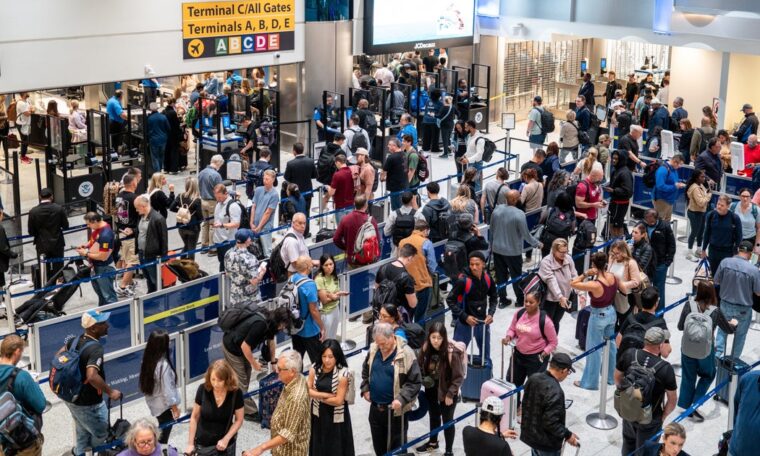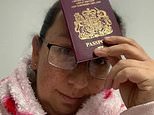
With the new Federal Aviation Administration order to scale back flights, air travel is about to get even more complicated for passengers already navigating a turbulent period for U.S. aviation.
“Right now, the Trump administration is planning to reduce air traffic at 40 airports across the United States if the shutdown continues,” Eric Napoli, chief legal officer at AirHelp, told HuffPost. “More specifically, 10% of air traffic would be cut from each airport, which could impact thousands of flights.”
The order, which comes as the administration ramps up pressure on Democrats in Congress to end the shutdown, directs airlines to reduce air traffic at major airports across the U.S., including metropolitan destinations with multiple impacted hubs.
“The first flight cuts from the DOT’s order hit the schedule on Friday ― smaller numbers at first but escalating into next week until the target of 10% is reached,” said Ben Mutzabaugh, managing editor of The Points Guy.
He added that the order was issued in order “to lessen the strain in the U.S. aviation system” in light of the current political impasse.
“Air traffic controllers and other federal workers have not been paid since the beginning of the shutdown, leading to an increase in the absence of controllers and TSA workers and creating staffer shortages at two crucial parts of the aviation system,” Mutzabaugh said.
Without pay, many air traffic controllers have needed to seek work elsewhere to make ends meet.
“Controllers are resigning every day now because of the prolonged nature of the shutdown,” Nick Daniels, president of the National Air Traffic Controllers Association, told CNN. “We’re also 400 controllers short ― shorter than we were in the 2019 shutdown.”
In the meantime, lessening the number of flights to oversee could be a way to “add a little more slack back into the system while the shutdown drags on,” Mutzabaugh said of the latest FAA order.
What does all of this mean for travelers?
This measure will affect travelers in several ways.
“First, thousands of travelers can expect to have their flights canceled because of the reduction in air traffic,” Napoli said. “If travelers have their flights canceled as a result of this government move, they are entitled to reimbursement from that flight ticket. We’ve already seen airlines communicating this to travelers on social media channels.”
Brandon Bell via Getty Images
The FAA has directed airlines to reduce air traffic at major airports across the U.S.
Even passengers whose flights remain on schedule may face ripple effects.
“For those who don’t have canceled flights, we can anticipate that there will still be delays,” Napoli said. “The government shutdown has led to a decrease in staffing at airports, meaning that everything is taking longer–security, takeoff, landing and more.”
What can travelers do in advance of their upcoming flights?
“A high level of preparedness is always a best practice when traveling, but is especially important when extraordinary circumstances like a shutdown occur,” Napoli said.
He advised travelers to do their best to remain informed about any flight-related updates.
“Make sure you’ve signed up for your airline’s email or text alerts that will ping you in the event of a schedule change,” Mutzabaugh said. “That includes cancellations, so these alerts would give registered travelers an early warning that their flights are among those affected and that it’s time to make alternate plans ― or perhaps abandon the trip.”
Even if your flight is not canceled, be prepared for a little potential chaos at the airport.
“Travelers should arrive at the airport earlier than normal to ensure that there’s buffer time for security and check-in, given in case of extended wait times,” Napoli said.
He also pointed to possible luggage-related disruptions amid staffing shortages and cancellations.
“I recommend that everyone pack a change of clothes and toiletry essentials in their carry-on bags,” Napoli said. “This is especially important if you’re traveling with kids. This can feel like a lifesaver if your luggage goes missing, or if you’re delayed in the airport after you’ve dropped off your bags.”
And in the event your bags are delayed, lost or damaged, don’t forget that airlines are required to compensate you for reasonable expenses.
As for the airports themselves, Napoli said they should do what they can to keep the process running smoothly despite the circumstances.
“While they can’t prevent people from calling out sick, keeping normal practices moving and making sure all check-in kiosks and self-service tools are functional will help passengers be able to check in without assistance from an agent,” he noted.
What about Thanksgiving travel?
For many Americans, the looming question is what this means for the upcoming Thanksgiving rush.
“Thanksgiving is one of, if not the, busiest travel time of the year, with huge numbers of travelers flying and passing through airports not just on the days around the holiday itself, but for up to a week ahead of time and after,” said Eric Rosen, director of travel content at The Points Guy.
“If these flight cuts, or even more severe ones, are in effect leading up to and during the holiday, it’s likely to impact the plans of millions of passengers ― whether that means more canceled flights, fewer rebooking options and massive potential delays both at airports and even on the tarmac.”
Rosen believes travelers will feel at least some residual effects regardless of what happens with the shutdown.
“Even if the government reopens quickly, the impacts of the shutdown are still likely to be felt for days and weeks to come as airlines and airports get back to business, so don’t expect air travel to revert to normal anytime soon,” he noted.
YourSupportMakes The Story
Your SupportFuelsOur Mission
Your SupportFuelsOur Mission
Join Those Who Make It Possible
HuffPost stands apart because we report for the people, not the powerful. Our journalism is fearless, inclusive, and unfiltered. Join the membership program and help strengthen news that puts people first.
We remain committed to providing you with the unflinching, fact-based journalism everyone deserves.
Thank you again for your support along the way. We’re truly grateful for readers like you! Your initial support helped get us here and bolstered our newsroom, which kept us strong during uncertain times. Now as we continue, we need your help more than ever. We hope you will join us once again.
We remain committed to providing you with the unflinching, fact-based journalism everyone deserves.
Thank you again for your support along the way. We’re truly grateful for readers like you! Your initial support helped get us here and bolstered our newsroom, which kept us strong during uncertain times. Now as we continue, we need your help more than ever. We hope you will join us once again.
Support HuffPost
Already a member? Log in to hide these messages.
And if you’re traveling over the holiday, he added, read the fine print on your travel protection.
“Airlines might not offer accommodations or meal vouchers to travelers stranded overnight by a delay or cancellation,” Rosen advised. “So be sure to book your tickets with a credit card that offers trip delay protection that might cover a night at a hotel and a meal or two, or you could be on the hook for hundreds of dollars.”
Source link
CHECK OUT: Top Travel Destinations
READ MORE: Travel News



